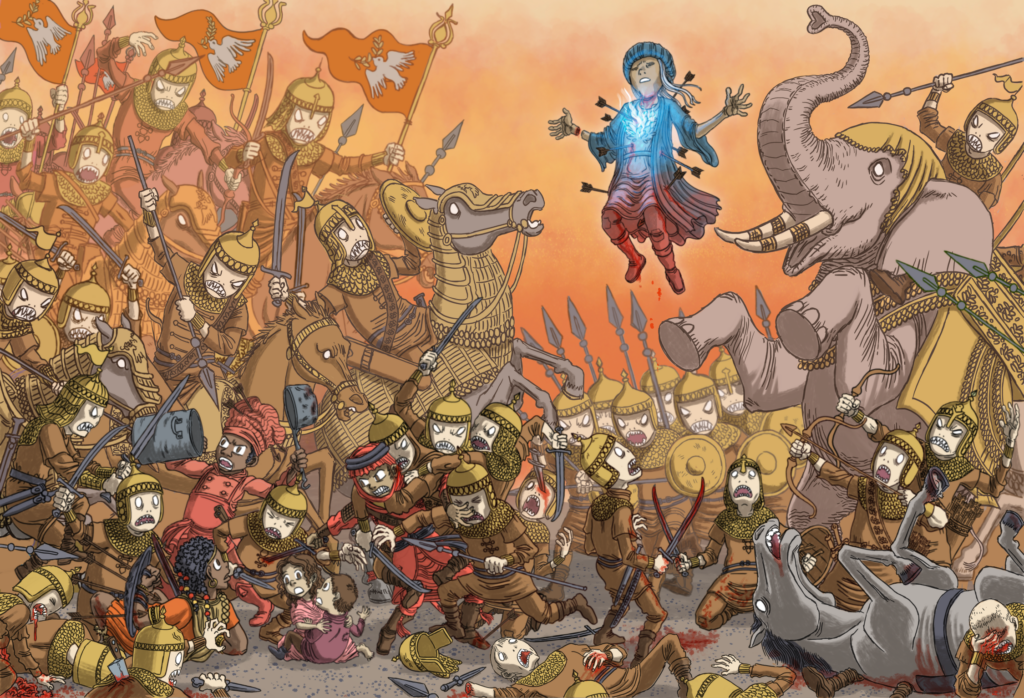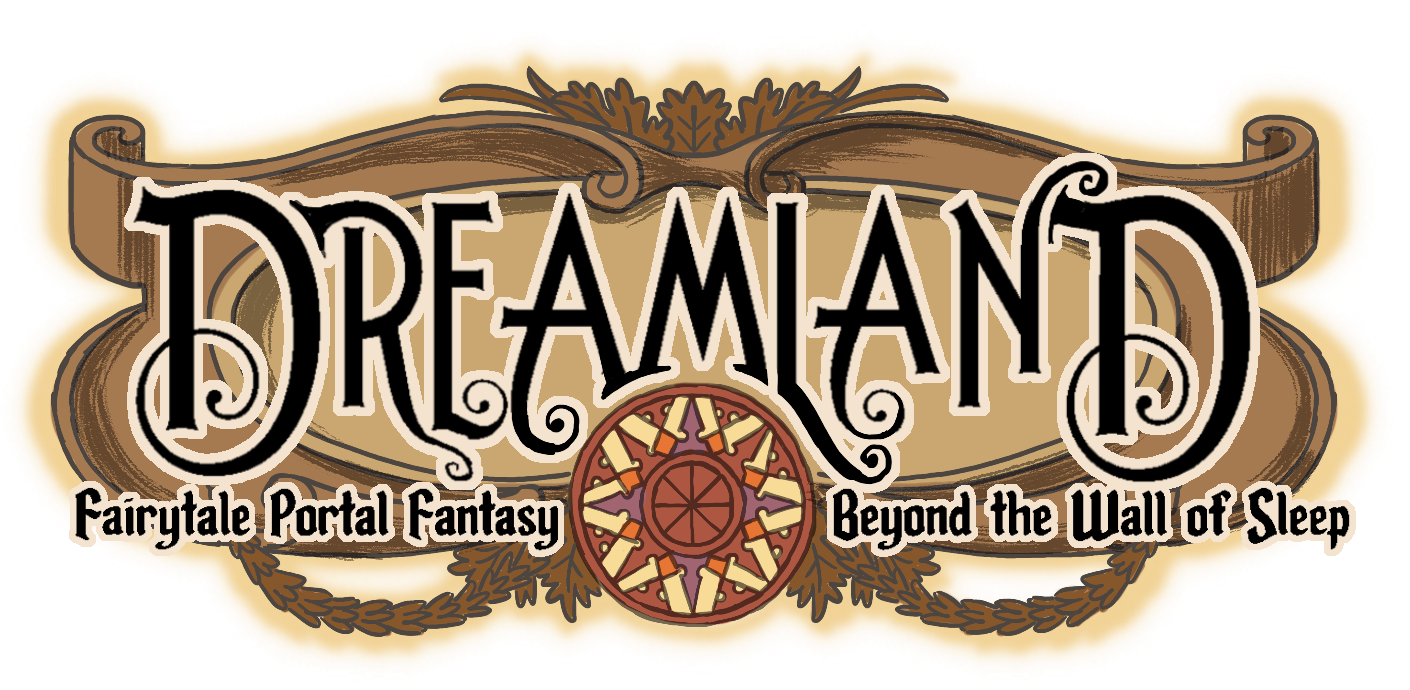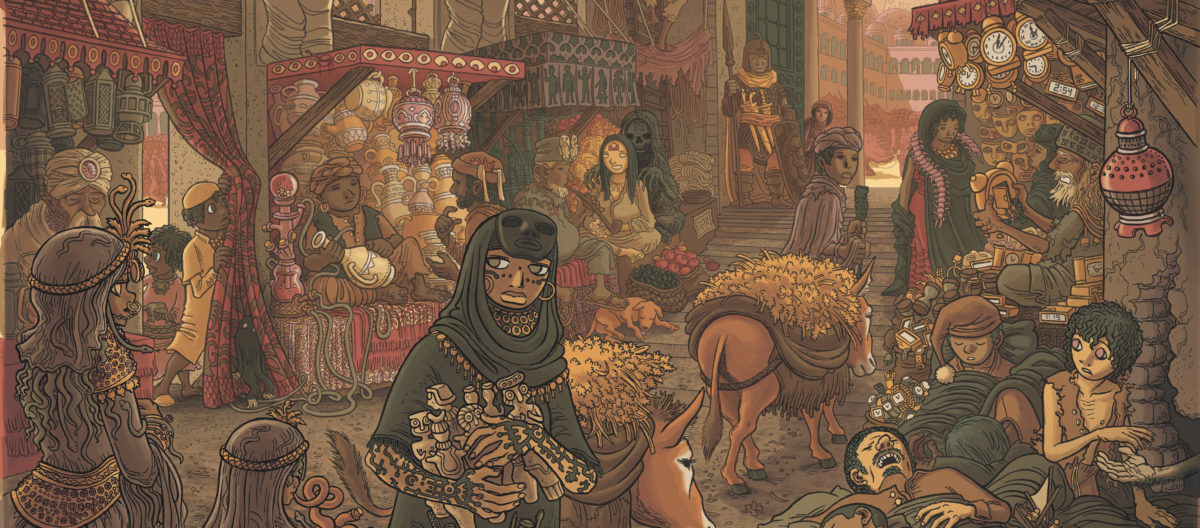
Whenever enough new folks join the Dreamland RPG Facebook group or Discord server, I’m going to be posting new Dreamland material (the FB and/or Discord folks get to vote on what it is). In celebration of the Discord reaching 325 folks, here is a brief post on high-level dreamers, specifically Level 4.
There are many more levels of dreamers beyond the Levels 1-3 described in the Dreamland QuickStart. At Level 4, your Personal Pool retains its maximum of 10 Words (as at level 3), and you choose one of four powers: Dream Share, Dream Control, Flesh to Dream or Dream to Flesh.
Dream Share
You gain the ability to take a single person from the waking world with you into Dreamland. They must be a close friend, lover or family member. By using this power, you awaken their latent power as a dreamer, and they discover their dream self.
You can use this power in one of two ways:
- bring a new PC (and player) into the campaign
- give yourself an NPC ally.
If you use this power to bring a new PC into the campaign, the player creates their character as usual, linking their waking-world character background to yours. In addition, as long as you are physically close to one another, you gain the ability to collaborate to make Wisdom (discipline) challenges or to cure Basic Impairments on either of you, regardless of your present or future Roles. You don’t need to use the Dream Share power to bring a new PC into a Dreamland campaign, but if you do use this power, the two of you gain this shared ability.
If you use this power to create an NPC ally, decide who they are and how you awaken their dreaming power. If you wish, you may describe this awakening in a waking-world scene. You also describe what their dream self looks like and what they do.
Your NPC ally isn’t created in the same way as a player-character dreamer; instead, you, the player, divide 8 points between the NPC’s Fighting, Speed, Perception, and Stubbornness. If the NPC is in a challenge, the dreamer rolls the relevant statistic +1D6 (rather than +2D6, as with NPC dreamers, described in Chapter 6, The Waking World). Your ally isn’t as strong a dreamer as you are and can’t create marvels, or at least not marvels as powerful as a player character’s. They also wake up from Dreamland more often than PC dreamers, frequently fading out of dream reality.
In game terms, using the Dream Share power to create an NPC dreamer allows you to summon them whenever you need them by spending 4 Words. Passion Words give you ×2 on this. (In character, they simply happen to appear when you need them.) Your NPC ally is always friendly to you, unless you have damaged the relationship somehow. After several hours or days, as determined by the DM, they awaken and vanish back to the waking world until you summon them again.
Like you, your NPC ally can cheat death by waking up; each time they “die,” they vanish back to the waking world, and can’t be summoned until after your next waking-world downtime. However, each “death” taxes your NPC ally’s waking self, reflected by depression, amnesia (lost Memories) and erratic behavior (Dream Shock Impairments). The third time your NPC ally dies, they permanently stop being a dreamer, and their waking self dies (1–2), loses all memories of you (3–4), or suffers a mental breakdown (5–6). Describe their tragic fate the next time you have a waking-world scene; once this happens, the Dream Share power ceases working for you.
At the DM’s discretion, there might be a way to restore the psyche of your NPC ally and increase the number of times they can cheat death.
Dream Control
You gain greater control over when you enter and exit Dreamland. At any time you are in the waking world, you can announce that your waking self nods off and enters Dreamland. This can happen instantaneously, for instance if you are in a car crash but before you make impact, or when a gun is pointed at your head but before the shooter fires. You also determine how long your dream lasts in the waking world: micro-nap, full night’s sleep, or month-long coma.
Since every player normally controls their own narrative in waking-world scenes, this power doesn’t have any rules effect in the waking world, but it may open up interesting story possibilities.
This power doesn’t allow you to escape the consequences of having three Dream Shock Impairments, or dying from the Cursed Impairment if you wake up and the Curse Timer is 0.
More importantly, while in Dreamland, you can create a vision of the waking world merely by focusing on a person or place and spending 4 Words; you don’t need to spend a Mystery half-Memory. Lastly, you gain +1 on Waking rolls, and you always succeed on a Waking roll on a natural 9 or 10.
Dream to Flesh
Your dream self becomes able, on rare occasions, to enter the waking world.
Whenever you wake up due to Dawn, spending a Mystery half-Memory, or other magical means, you can choose to have your waking-world body remain asleep while your dream self emerges into the waking world instead. If you wake up due to dying or the Night Clock striking Midnight, you can’t use this power and you wake up normally.
If you awoke at Dawn, spent a Mystery half-Memory or used Dreamland magic to wake up, your dream self appears next to your waking body. If you woke up by going through a magic portal, your dream self appears at the waking-world end of the portal, perhaps far from your waking self.
Your dream self can only spend a short time in the waking world: about an hour around dawn or dusk, only a few minutes at other times of day. Your dream doppelgänger looks real but has almost no physical presence, like a ghost. You can’t be physically hurt or physically hurt anyone. You can make noises and are able to speak the same primary language your waking self speaks, although in your mind you’re speaking Road. At the end of your allotted time, you fade away and find yourself again in Dreamland.
However, once per game session, with the greatest effort, you can take a waking-world object and bring it back with you. You can either narrate this during a waking-world scene, or you can retroactively announce that you did it the last time you woke up and reveal that you have been carrying the item or secretly keeping it nearby ever since. You achieve this by using your dream self’s Legerdemain skill, though normally, you can’t use dream skills in the waking world. If you don’t have Legerdemain as a Role and/or bonus skill, you can’t bring objects from the waking world.
Your Legerdemain target number depends on the size of the item:
Sample Item Target Number
Tiny object: coin, ring, bullet, key, credit card 2
Handheld object: lamp, spear, gun, alarm clock, sandwich, gold watch, iPhone 4
Large object: machine gun, ladder, picnic basket full of food, desktop computer 6
Huge object: car, motorcycle, queen-sized bed, wagonload of food, etc. 8
Enormous object: truck, boat, trailer home, tank, helicopter, etc. 10
You can’t use Words or Role or bonus powers on this special Legerdemain challenge, and you can only attempt it once per game session. If you succeed, the item materializes in Dreamland. If you fail, your dream doppelgänger couldn’t touch the object (if you make the roll during a waking-world scene), or you find that the item didn’t make the journey (if you make the roll retroactively). If you roll a 2 or higher, but don’t roll high enough to get what you wanted, you bring over a small portion of the thing you wanted instead.
The DM determines the statistics of objects brought over from reality. Guns and modern weapons provide Fighting bonuses. Cars can move at incredible speed but get flat tires quickly on Dreamland’s unpaved roads. Things such as cellular data networks, gasoline and electrical outlets are essentially nonexistent in Dreamland, and any device which requires such things rapidly becomes useless. By default, your dream self has a rough understanding of how to use any item you brought over. You can’t use this power to bring living creatures to Dreamland.
It’s possible that your waking self might wake up while your dream self is in the waking world, and that your two selves could meet one another. If this happens, you roleplay both your dream self and waking self simultaneously, for the few minutes until your dream self fades back to Dreamland.
Flesh to Dream
Your waking self becomes able, on rare occasions, to directly possess your dream self’s body.
By spending any half-Memory, at any time, you can choose to have your waking self temporarily take greater control, to the point that your dream self’s body changes to resemble your waking self, though your clothes and belongings don’t change. You choose (out of character) whether your dream body literally transforms into your waking body, or whether you develop merely a partial resemblance such as speaking in the voice of your waking self, changing into a hybrid halfway state, or altering in some small way such as eye color. There is always some sign of the change, however small, which your companions or an alert Dreamlander can notice.
While your body is thus altered, you gain access to the skills and powers of your waking self. Choose from one to all six of your waking-world skills and replace your dream self’s skills with them on a one-for-one basis, as if you had the Dream Skills Impairment. If your Role has fewer than six skills, you must choose which waking world skills to bring over, up to the maximum number of your Role skills. If you had the same skill in both worlds, you instead add +2 to it.
In addition, choose one of your Role powers that relates to a Pillar Word; you may, if you wish, change it so that it works with one of the Pillars of your three Memories (such as Wondrous Eloquence becoming Loathsome Eloquence).
If you use this power while Transformed into a beast, you can still replace your skills and a Role power, but your physical form remains that of a beast until the Impairment is removed.
While your waking self takes control, your dream self’s consciousness becomes foggy, and they feel the emotions of your waking self. Depending on how your two selves feel about one another, this could be a pleasant and consensual gestalt, or a shocking experience of unwanted possession. The DM may require you to spend 4 Words for your dream self to resist your waking self’s impulses, as if you had the Half-Awake Impairment.
Possession is physically draining, and sooner or later the possession ends, and your dream self becomes Exhausted and returns to normal. You decide (out of character) how long each possession lasts. Taking possession for an hour or less is easy, but if you seek to take possession for a longer time, you must spend 8 Words to do so. Loathing and Mystery Words give you ×2 on this. If you become Exhausted for any reason during this period, you return to normal.
Possessing your dream self too much is harmful to both your psyches; whenever you wake up after a dream in which you used this power at least once, you have a –1 penalty on your Waking roll, and you always fail on a roll of 1.

